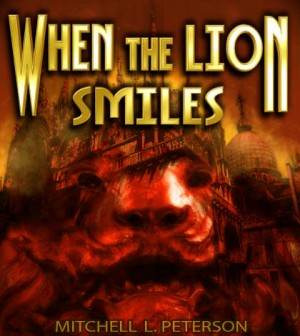The coffee boiled into the upper creel and Franco poured it into two demitasse cups. He offered one to Antonio and then sat back at his desk with his. Sugar was offered and declined.
“But isn’t that dishonest?” Antonio protested.
“Yes…” Franco answered thoughtfully, “it is dishonest but what shall be done, to let a crime go unsolved so that we may protect a man who dishonors his wife? It is possible,” he snickered, “that we may have yet another crime after he testifies but that is not our concern, until of course, his wife cuts his throat for being a pig! Then we would have yet another offense to investigate.”
Even Antonio had to laugh at the thought of that.
“You are not concerned with moral principles so much as solving the crime. As long as you have not broken the law yourself, ethics are beside the point; the end justifies the means in the gathering of information. If in the end your conscience weighs on you, comfort yourself in this; a criminal is in jail and you have made society safe for one more day, one more night. Whether the philanderer is safe or not is between him, his wife, his mistress and God! As to ethics, you must separate your personal code of morals; in this rather simple example, a willingness to tell a small lie, from your social duty and responsibility.”
Antonio sipped his coffee and then asked,
“I don’t understand what you mean by ‘see’ when one is being deceitful.”
Franco drained his cup and set it down.
“Very well, let us proceed in a very simple and direct fashion for an example. I want you to ask me if I have committed the crime…”
“What crime?” Antonio asked.
“Any crime, the facts are not important. I want you to ask me twice if I am guilty and then I want you to see how I answer in both cases.”
Antonio drained his cup and set it down as well.
“Benon, are you guilty?” He asked.
Franco leaned back in his chair, crossed him arms across his chest and allowed his face to flush. His eyes darted back and forth and then down as he searched for the answer before he finally answered,
“No.”
He paused a moment and then said,
“Ask me again in exactly the same words as before.”
Antonio asked again,
“Are you guilty?”
Franco leaned forward, looked him straight in the eyes and softly but sincerely affirmed his innocence.
“No.”
He paused a moment more before speaking.
“Now then, do not tell me what you heard, tell me what you saw!”
A small light of recognition flashed behind Antonio’s blue eyes.
“You lied the first time!” He exclaimed.
“And how do you know that I lied?” Franco asked.
“It was written all over your face and body!” Antonio blurted.
“Yes, even though in both cases the answer was the same, one was obviously a lie and the other was just as obviously truthful. This is a very simple, overly simple example and you will rarely see such an overt display in an actual encounter, but you understand now what I mean by see the answers to your questions. There are other things to consider, of course for nothing is as it seems during an interview. For instance, you interpreted my flushed face and my crossed arms, and other signs as deceit and in this case you interpreted correctly, but a man who is truthful may also do these things because he is frightened.”
Antonio went back to being confused. Perer, ever the good interviewer, sensed his puzzlement and moved to comfort him.
“Let us take one sign of deceitfulness as an example. During an interview a man sweats profusely… would you say that he is being truthful or no?”
“I would say, Maestro, that he was lying.”
“Good. But wait, can it be because the man has a cold or influenza and he is running a fever? Maybe it is because he is frightened to death at being in a police station? Perhaps it is because he always sweats when he is nervous whether he tells the truth or not! Perhaps, he is perspiring because he is concentrating so hard on the conversation, as you are now.” Franco gestured toward his young student.
Antonio looked down at his armpits and though the temperature in the room was at a comfortable level, large dark rings of moisture collected at the underarms of his shirt. Franco smiled at his colleague’s newfound embarrassment and continued.
“There are any number of reasons, all valid, for certain behaviors that would normally indicate truthfulness or deceit but could just as well suggest that the room is simply too warm! You see? Every factor must be taken into account and either added into the equation or dismissed. What are his eyes doing when you ask him a question? Imagine if you will, that the brain is like a large cassettone, a chest of drawers, and in every drawer is held a piece of information. When a person wishes to access that information his eyes will perform a function, largely involuntary except to the professional liar. The truthful man’s eyes will dart back and forth and then up as he seeks to access and then recall the information. The liar’s eyes will dart back and forth and then down.”
Antonio wrote the small piece of information down. Franco continued
“Now then, write this down as well, since you are so fond of writing, a habit we shall endeavor to break since writing can be a grave distraction during an interview; although this is true most of the time, it is not always true. And so you cannot take it as an immutable rule. There are those people who access the truth opposite to the explanation I just gave you, and also, do you think that we, I am the only one in the world to knows these things? An accomplished liar or a professional diplomat or politician also know these things, as do a multitude of others, and will use this information to evade telling you the truth even as they make you believe that they have told you the truth! Knowing what is truthful and what is not in an interview takes preparation, time and intuition; the latter can only be honed to a fine edge with experience and practice; as for the preparation, this is where your fine talents as a policeman become important. You must do your footwork long before you interview, and have some clear suspicion as to what is true and what is not through your investigation of the specifics of the crime itself. You must come into the interview armed with enough facts so that you know when you are being lied to, based on the circumstances of the misdeed, and having established a, shall we say ‘base line’ of truth, gauge whether your subject is lying to you about what you already know to be true. It is a large game and you must never reveal what you know. Let them think you know nothing! Let them think you are stupid or brilliant if it serves a productive purpose. Never tell anything with your eyes or your own body! Knowing the “tells” as card players call them, will only serve you if you can control your own. And so it is that when you tell a lie in order to get more information, you must do so without giving yourself away even as you hope they will give themselves over to you, betrayed by their own bodies.”
Antonio put his hand to his forehead and winced.
“Tell me Antonio, do you play chess?”
“No, Maestro.”
“Then you shall learn…”
~
Martin looked at the clock; it was 6:00 a.m. His normal time to get up. He thought about lying in bed for a while. What use was there, after all, to go to the office? It seemed to him that it wouldn’t be there for very long. And yet he had to hope that Bill would be able to somehow salvage the divorce proceedings. The judge had given them ninety days. Surely in ninety days, he, Bill, could come up with something to salve the ever-smiling Landiss and his soon to be ex wife. He had to think! In the old days when he had to think, he would have a drink. Well, he couldn’t do that anymore, besides, it was too early in the morning. Coffee; he would have coffee.
Martin grabbed his robe from behind the bedroom door, slid his feet into his slippers, and padded down the hallway to the stairs on his way to the kitchen. He didn’t turn on the lights. There were two things that Martin did not like early in the morning. Bright lights and noise. Elizabeth was an early riser, an abrupt riser. From the moment her alarm clock went off, she would leap out of bed, throw open the curtains and immediately attack life as if it were a helpless lamb and she a ravenous tiger! Martin on the other hand, rose slowly, tiptoed through the darkened house, sat at the kitchen table drinking his coffee, greeting the morning silently and slowly. How two such different people had attracted each other and gotten married was beyond him. Small surprise then, that they were about to be divorced.
In the semi-darkened gloom of the kitchen, Martin reached to the cupboard, pulled out a container of coffee, grabbed a paper filter, and began to spoon the grounds into the upper basket of the coffeemaker. He filled the reservoir with water, shoved the filter into place, switched it on and sat down at the kitchen table. Bill would not be in his office until 9:00 a.m. What was he going to do for three hours? He could call him at home, he had his number, but he wouldn’t be up until at least 7:30, maybe even 8:00 o’clock. Would he just sit at the kitchen table and ruminate? My God, he had been up half the night doing that! No, he would finish his coffee and take a long leisurely shower. After all, who was there at home to complain that he was using all the hot water?
At precisely eight o’clock, Martin grabbed the portable phone and dialed Bill’s home number. On the third ring, Bill Matthews answered his telephone.
“Hello.”
~
When the Lion Smiles © 2011 by Mitchell L. Peterson
All rights reserved. No part of this book may be reproduced. Stored in a retrieval system or transmitted in any form or by any means without the prior written permission of the publishers, except by a reviewer who may quote brief passages in a review to be printed in a newspaper, magazine or journal.
First printing
This is a work of fiction. Names Characters, places, and incidents either are the product of the author’s imagination or are used fictitiously. Any resemblence to actual persons, living or dead, event, or locales is entirely coincidental.
PublishAmerica has allowed this work to remain exactly as the author intended. Verbatim, without editorial input.
Available in Paperback, Kindle & Nook editions, and in Hardcover from, PublishAmerica, Amazon & Banes and Noble.
PUBLISHED BY PUBLISHAMERIC, LLLP
Balitmore














